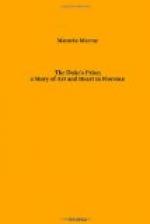Stella was lovely as before, but in her face there was a more pensive expression than usual, a sadness that was not customary. For she had not seen him whom she adored-the brave youth who had twice esteemed his own life as nothing, in order to snatch her from death. And what could move her father if this could not? He was more thoughtful than before, and never spoke of that scene. He had never even offered to express his gratitude to her deliverer.
Yet that evening she was again to go to the gardens of Boboli and meet her lover. Her heart bounded with joy at the anticipation of coming happiness; and the moments seemed like hours, as they slowly, slowly passed away.
Again the beautiful gardens were arrayed in loveliness, and beneath the solemn shade of the lofty trees Mario again sat beside his Stella. They could hardly speak their hearts were full.
“And so you were long by Thrasymene and never came to me, Mario,” she at length said.
“I would not do so. It was enough for me to be near and watch you.”
“But not enough for me,” she cried, with tears in her eyes. “O Mario! I am doubly yours, for you have twice saved me from death.”
“Speak not of that,” he said. “I must soon know my fate. My picture is nearly finished. In two days it will hang in yonder palace,” said he, pointing to the Palazzo Pitti. “For-what do you think-the Grand Duke has visited my studio, and told me to bring it there.”
“The Grand Duke! Was he pleased with it?”
“He praised it in unmeasured terms.”
“I knew so, Mario.”
Blissful was the interview, and sad were the lovers to separate. But they had to depart, and soon Stella was at home.
Mario, filled with pleasing hope, looked at the beauty of the scene, and went out for a walk. He wandered toward the southern gate, and went out up a long avenue, where trees overhanging formed a long and shadowy archway. It was a still and peaceful walk at evening. He sat down at length behind the trunk of one of the trees, and fell into a reverie.
Soon he was roused by the sound of approaching footsteps. He looked down the road, and saw two men stealthily approaching, armed, and conversing earnestly in low tones. They stopped not more than two yards from him and sat down. Mario could not be seen on account of his concealed position.
“Federigo,” said one, “this is bad business.”
“What!” said the other—“a bad business?”
“I mean not bad, but dangerous. Now if it were only to take a few piastres, I would not care; but to kill a man, coldly and without provocation, is rather bad.”
“But we get two hundred, you know?”
“Ah, there you are right. They will jingle pleasantly, will they not?”
The sound of a horse’s steps was heard coming down the road. The men crept into concealment and were silent. Mario also preserved silence, and clenching his stout stick more firmly, waited the issue.




